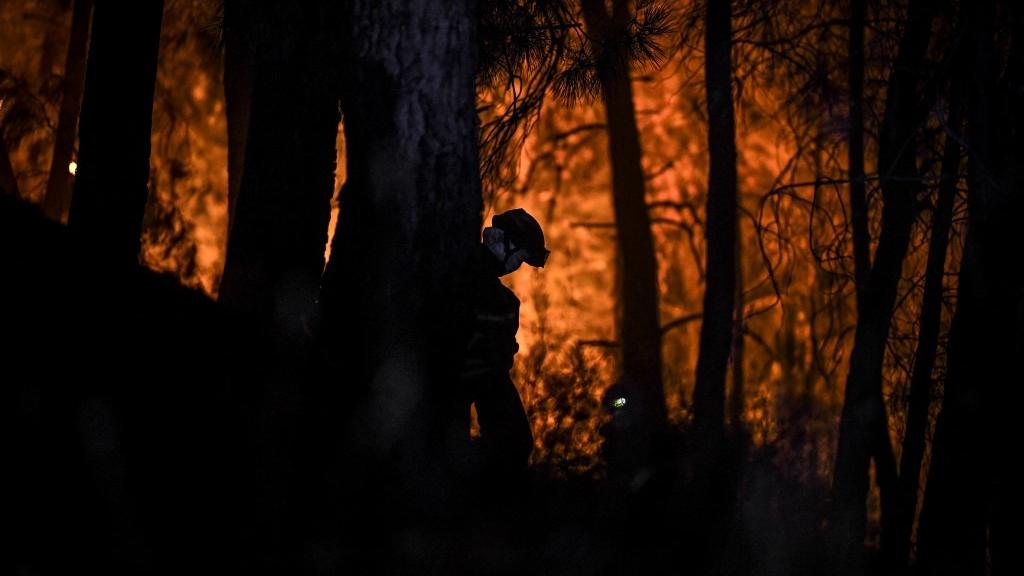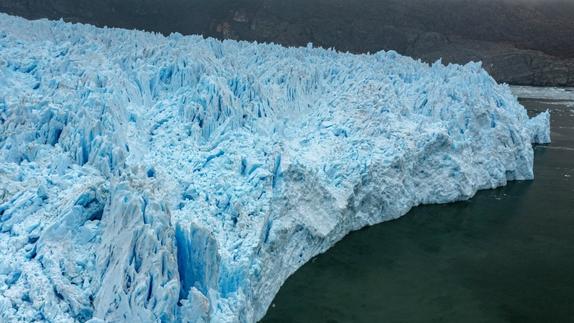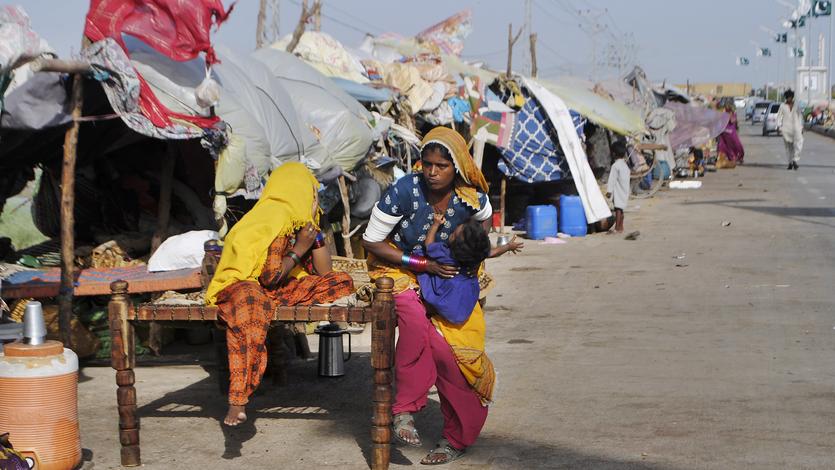 A silhouette of a firefighter is pictured during a wildfire in Manteigas, central Portugal, on Aug 10, 2022. (PATRICIA DE MELO MOREIRA / AFP)
A silhouette of a firefighter is pictured during a wildfire in Manteigas, central Portugal, on Aug 10, 2022. (PATRICIA DE MELO MOREIRA / AFP)
Scientists are warning that “irreversible climate tipping points” are now more numerous and closer to being triggered than scientists had previously thought, as shown by frequent disastrous droughts and floods, hurricanes and typhoons.
As the United Nations pushes for a reduction in carbon emissions in a bid to bring global warming down, many researchers now say climate change has already reached the point of no-return.
In a research report published on Sept 9 in the journal Science, a team of scientists, using data compiled since 2008, found there are now 16 major tipping points, almost all of which could reach the point of no return if global warming continues beyond 1.5 C above pre-industrial levels
The study warns that “irreversible climate tipping points” are now more numerous and closer to being triggered than scientists had previously thought.
Tipping points are when the key components of the earth’s climate such as the Amazon rainforest or the Greenland icesheet start to irreversibly break down.
Once a tipping point has been reached, that tipping element will experience runaway effects that essentially doom it forever, even if global temperatures become cooler, scientists say.
ALSO READ: 'Time is up': Nations trapped in climate crisis raise alarm at UN
In a research report published on Sept 9 in the journal Science, a team of scientists, using data compiled since 2008, found there are now 16 major tipping points, almost all of which could reach the point of no return if global warming continues beyond 1.5 C above pre-industrial levels.
The scientists concluded that there is “strong scientific evidence for urgent action to mitigate climate change”.
They said even if the Paris Agreement goal of limiting warming to below 2 C and preferably 1.5 C is not safe “as 1.5 C and above risks crossing multiple tipping points”.
“Crossing these climate tipping points, or CTPs, can generate positive feedbacks that increase the likelihood of crossing other CTPs. Currently the world is heading toward 2 to 3 C of global warming; at best, if all net-zero pledges and nationally determined contributions are implemented it could reach just below 2 C,” the report concluded.
“This would lower tipping point risks somewhat but would still be dangerous as it could trigger multiple climate tipping points.”
Study co-author Johan Rockstrom, director of the Potsdam Institute for Climate Impact Research in Germany, said, “This sets Earth on course to cross multiple dangerous tipping points that will be disastrous for people across the world.”
ALSO READ: UN: Australia climate change inaction violated islanders' rights
 Aerial view of the San Rafael Glacier in the region of Aysen, southern Chile, on Feb 13, 2022. (PABLO COZZAGLIO / AFP)
Aerial view of the San Rafael Glacier in the region of Aysen, southern Chile, on Feb 13, 2022. (PABLO COZZAGLIO / AFP)
Co-author Tim Lenton, director of the Global Systems Institute at the University of Exeter in the United Kingdom said, “Since I first assessed climate tipping points in 2008, the list has grown and our assessment of the risk they pose has increased dramatically.”
This sets Earth on course to cross multiple dangerous tipping points that will be disastrous for people across the world ... To maintain liveable conditions on Earth, protect people from rising extremes, and enable stable societies, we must do everything possible to prevent crossing tipping points.
Johan Rockstrom, director of the Potsdam Institute for Climate Impact Research in Germany
The scientists have isolated five key tipping points: the Greenland and West Antarctic ice sheets; Arctic permafrost; tropical coral reefs and a key ocean current in the Labrador Sea.
They also isolated another 11 “likely” or “possible” tipping points if warming continues past 2 C.
“To maintain liveable conditions on Earth, protect people from rising extremes, and enable stable societies, we must do everything possible to prevent crossing tipping points,’ Rockstrom said.
Another report by a new multi-agency coordinated by the World Meteorological Organization, or WMO, said: “Climate science is clear: we are heading in the wrong direction.”
ALSO READ: 'Climate penalty': WMO warns heatwaves will worsen air quality
“Without much more ambitious action, the physical and socioeconomic impacts of climate change will be increasingly devastating,” the report said.
Titled United in Science, it showed greenhouse gas concentrations are continuing to rise to record highs.
The ambition of emissions reduction pledges for 2030 needs to be seven times higher to match the 1.5 C goal of the Paris Agreement.
According to the WMO the past seven years were the warmest on record.
Cities that host billions of people and are responsible for up to 70 percent of human-caused emissions will face increasing socio-economic impacts.
In a video message reacting to the report, United Nations Secretary-General Antonio Guterres, said: “Floods, droughts, heatwaves, extreme storms and wildfires are going from bad to worse, breaking records with alarming frequency.”
 Displaced families who fled their flood-hit homes take refuge along a roadside in Jamshoro, southern Sindh province, Pakistan, Sept 16, 2022. (PERVEZ MASIH / AP)
Displaced families who fled their flood-hit homes take refuge along a roadside in Jamshoro, southern Sindh province, Pakistan, Sept 16, 2022. (PERVEZ MASIH / AP)
This year’s United in Science report shows climate impacts heading into uncharted territory of destruction. Yet each year we double-down on this fossil fuel addiction, even as the symptoms get rapidly worse.
Antonio Guterres, United Nations Secretary-General
“Heatwaves in Europe. Colossal floods in Pakistan. Prolonged and severe droughts in China, the Horn of Africa and the United States. There is nothing natural about the new scale of these disasters. They are the price of humanity’s fossil fuel addiction.”
“This year’s United in Science report shows climate impacts heading into uncharted territory of destruction. Yet each year we double-down on this fossil fuel addiction, even as the symptoms get rapidly worse.”
“Climate science is increasingly able to show that many of the extreme weather events that we are experiencing have become more likely and more intense due to human-induced climate change.”
READ MORE: Climate, conflicts raise stakes in hungry world
Emeritus Professor Neville Nicholls from the School of Earth, Atmosphere and Environment at Monash University said the reports show “our slow progress in restraining the growth of greenhouse gases means that the world will not be able to restrain global warming sufficiently to avoid at least some deleterious impacts.”


